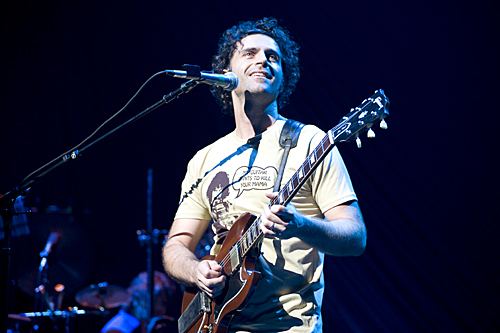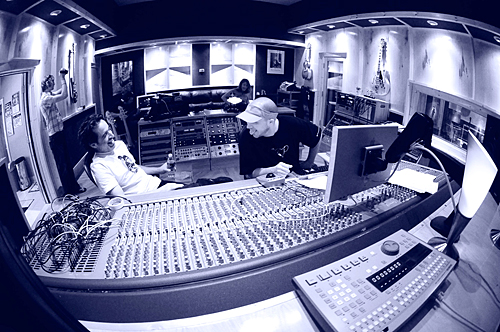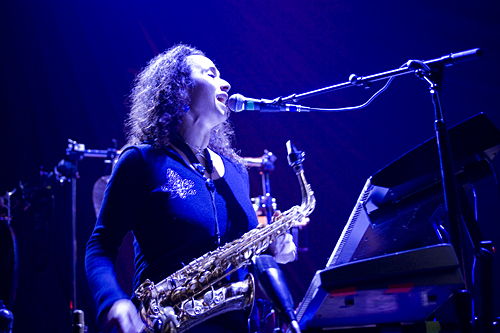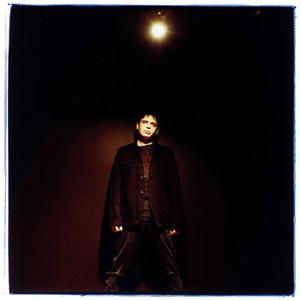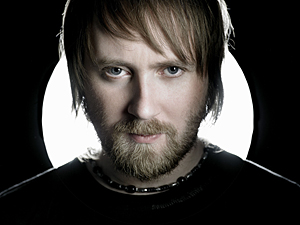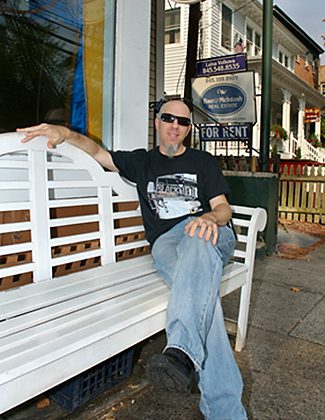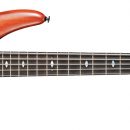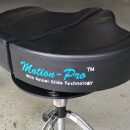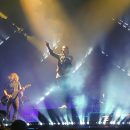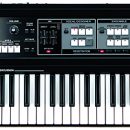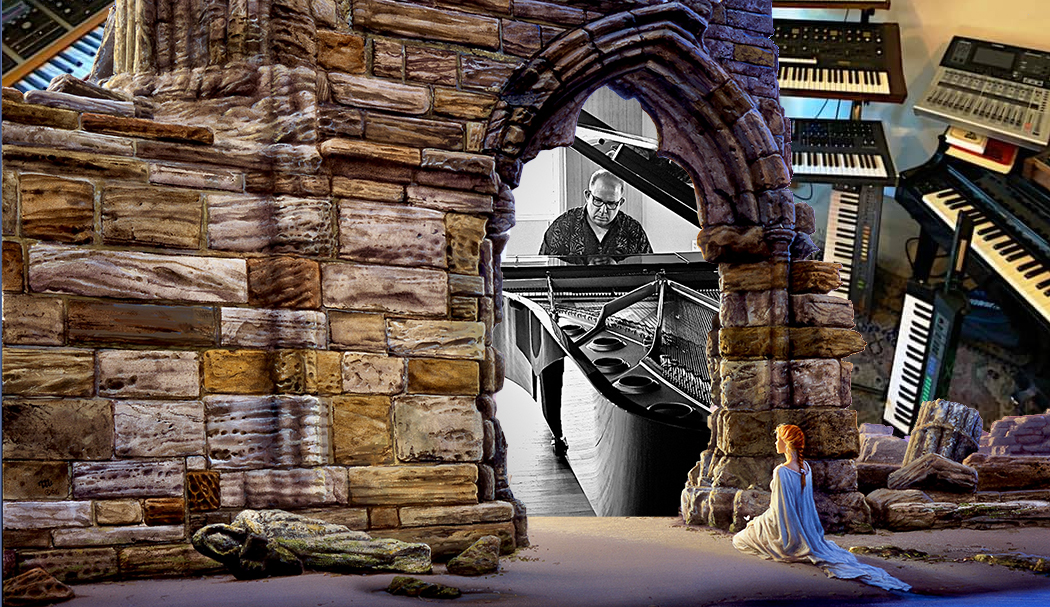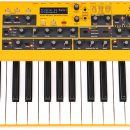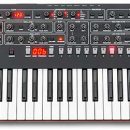To really “know” the music of Frank Zappa requires more than just a passing familiarity with a few comical singles released in the ‘80s. If all you can think of are Valley girls and yellow snow, then you haven’t begun to embrace the musical genius that was legendary songwriter and musician, Frank Zappa.
On one hand, Zappa music is music for musicians. Embracing a wide range of styles from rock to jazz to pop to classical (sometimes within the scope of a single song), this music is the stuff of deliberate calculation. The changes come at you when you least expect them, time signatures seem at times to be more the guide than the rule, and the seemingly random breakdown of musical sections into wild improvisation are all deliberately crafted parts of a greater whole.
But on the other hand, Zappa music is also fun for the masses. There’s a big theatrical element to the songs, whether it’s the broad palette of styles embraced in one performance or vocals that range from multi-part harmonies to spoken word to comical rhetoric all within the span of a few minutes. Although listening to a Frank Zappa album might be too cerebral at times for less disciplined musicians and non-musicians alike to embrace, anyone with a love of music can attend a live Zappa performance and come away with having enjoyed a fantastic theatrical musical experience.
Of course, you can’t just catch a Frank Zappa concert, given that the musical genius passed away in 1993. Or can you?
Enter distinguished pro guitar player Dweezil Zappa, son of the late master. Guitar players have been familiar with Dweezil’s playing for a few decades now. His recording career dates back to the ‘80s. Influenced historically by Eddie Van Halen and Jimmy Page, Dweezil has been a noted shredder who guest appeared on numerous recordings, released multiple solo records, and then also released a few albums with his brother, Ahmet.
But it’s the latest chapter in Dweezil’s musical journey that really caught our eyes and ears: Zappa Plays Zappa. Dweezil took it upon himself to bring the music of Frank Zappa to a new generation of fans who have yet to discover the singularly unique sound and style of his late father. And while learning a few cover tunes is all in a days work for many of our readers, learning the music of Frank Zappa is another story entirely (in fact, the first person to adequately transcribe Frank Zappa’s music was a then-young Steve Vai). In Dweezil’s case, learning the music of his father required over a year of intense study to internalize the sound and feel of Frank’s guitar playing.
The Zappa Plays Zappa band features outstanding musicians, but rather than amassing a collection of Frank Zappa band alums (many of them have guest performed with the group), the new band features a younger generation of players in the hopes that they will appeal to a new, younger audience. In that regard, they succeed admirably, while still impressing the hell out of older Frank Zappa fans.
Now a few years into Dweezil’s great experiment, Zappa Plays Zappa continues to grow in popularity. We caught up with the band while on tour in support of Dream Theater’s Progressive Nation tour to talk about the band, the gear (Dweezil’s a gear fanatic just like us), and the future.
Some people… thought that the only real way for this to be considered viable was to have only alumni in the band.
MPc: Growing up, were you a fan of Frank Zappa music, or were you just into the rock & roll thing?
DZ: No, I was a huge fan of the music. The thing about it was, having heard it my whole life growing up, I always knew there were so many more possibilities with music. So when I started hearing things outside of Frank’s music, listening to the radio when I got older — I didn’t really hear anything other than what Frank was working on or listening to in the home until I was about 12. Then, I started hearing other stuff.
But when I did hear other stuff, I noticed that there wasn’t as much variety in the music and I noticed there wasn’t as much detail and technical challenges in the music. And there was in some rock music, but in a slightly different way. Say, Van Halen or Led Zeppelin and there’s some complex things going on there and even in some Beatles stuff, you know, harmony-wise and whatnot. But I didn’t hear the same kind of things.
MPc: What made you decide that the time was right to change the focus of your career, at least for now, on really bringing your dad’s music to the public?
DZ: Well, I had the feeling that people didn’t really know the music. Anybody under thirty had no concept of the music or even that much about my dad at all. So I had all these experiences where you’d talk to anybody and say, “Well, what do you know about Frank Zappa?” “Who?” You know? So that didn’t sit well with me, because I thought his music was overlooked by so many, and misunderstood by so many.
So I thought it would be a good idea if it was possible to put a band together that could introduce the music to a younger generation. And that’s what I set out to do, but doing it with paying the most respect to the music and really not turning it into a spectacle that could be perceived of as a “Hey, look at what I can do” kind of thing. It was really just about “Let’s get this music out there for people.”
MPc: Yes. And I seem to recall reading somewhere that it took you quite a while to really learn how to play your dad’s music.
DZ: Yeah, well, there were a lot of things involved. First off, I set some pretty high challenges for myself in terms of what I wanted to do on guitar. I learned things on guitar that were never meant to be played on guitar. And the process of doing that required an extreme makeover in terms of my own technical abilities.
And so the process of listening to the music and making changes really took two years of listening and working on these changes to my technical approach, as well as a mental approach to playing, before I even put the band together. And then I felt like, okay, this is do-able.
MPc: Tell us about putting the band together. You found some pretty amazing musicians who, like yourself, are also not of Frank’s generation, musically.
DZ: Well, that was the goal. I wanted to in some way be able to represent the music in a modern setting with a younger set of musicians. I didn’t want to be hampered by the fact that some people in the beginning of all this thought that the only real way for this to be considered viable was to have only alumni in the band.
And I was never keen to work with only alumni, because I thought that was the wrong approach. That, to me, said that people have no confidence in the music itself and they only believe that Frank’s music was played well because of the people that played it. And that’s not the case. The music stands on its own and you can play this music with respect and play it well. You don’t have to be an alumni, but you do have to respect the music.
The way kids listen to music today is, they don’t feel there’s any reason for them to buy it.
MPc: This music is meant to be experienced live. The show really blew me away.
DZ: I’m glad that you had that experience and I think that’s similar to every audience that we’ve played for. It’s really been this thing where the casual listener has only known sort of the humorous side of Frank’s music. You know, “Don’t Eat the Yellow Snow,” “Valley Girl,” that kind of stuff. That’s all they tend to really know and then that gives the wrong impression.
So when you see all this other stuff all within one show, so much variety and depth that, especially when you’re seeing it live, you have a completely different feeling and so many people have been very inspired to dig deeper and listen to more of it. That was the whole goal. So it has been working.
MPc: Absolutely. And opening for Dream Theater, I imagine things could have gone amazingly great or horribly wrong with the crowd.
DZ: My feeling for that was that any time we have the opportunity to play to an entirely new audience, that’s a good thing. If people are open-minded at all, I think we can give them a chance to experience something different. And typically a real rock, die-hard rock audience is not going to be so excited about jazz stuff and this, that, and the other.
But the music that we choose to play for this audience has a good balance of rock elements that they’ll be well familiar with and then we give them a taste of a few other things that… it’s just all contrast. A lot of times with that kind of rock music and that kind of rock audience, they’re getting so much of the same thing without very much dynamics and they love the technical elements and they’re waiting for more and more of that kind of stuff. And there’s tons of that in Frank’s music, but there’s also a lot of variety in compositional styles and the technical elements are there, but it’s not always the same thing, and it’s very unpredictable.
MPc: Fortunately, today you’ve got the same kid listening to everything from hip-hop to metal. Kids today seem to have a pretty open mind about various genres of music.
DZ: Yeah, but the one thing that’s different (for sure) about the way kids listen to music today is, they don’t feel there’s any reason for them to buy it, which is a total lack of respect for music and the artists who made it. And I think, obviously, that’s driven the quality of music down, down, down.
But there is that one area where, if somebody does find someone they like and they want to be a fan, they will support it financially at some point. The thing that is really annoying about it is that people just don’t respect copyrights and all of these kinds of issues that have changed the music industry in such a terrible way.
I mean, we’re just trying to exist in a world that has changed drastically, but there seems to be a… never have been a better time to try to put the spotlight on Frank’s music because of how there’s really nothing that sounds like it. You know what I mean? So in this day and age, kids might be more ready to accept and understand this music once they find it, because it really stands in stark relief against the other things that are out there that have none of those elements. Kids don’t typically have any exposure to things that have extreme structure and wild improv all in one thing, you know?
MPc: Yeah.
DZ: That’s a concept that doesn’t exist in most musical situations and it’s very prevalent in Frank’s music.
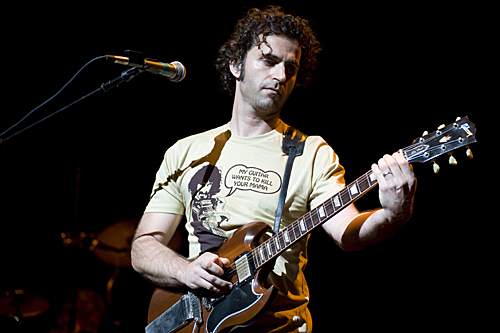
MPc: Sure. And speaking of oddities, the Gibson SG seems (to me) an odd guitar choice for a player like you.
DZ: Well, the guitar that I most associate with Frank is a Gibson SG. He played it quite a bit throughout the ‘70s and they’re incredibly easy guitars to play, once you get used to them. I used to be more Stratocaster-oriented and Gibson guitars tended to be more difficult for me to play because of the string spacing and the way that the neck is designed [differently] for both a Strat and a Gibson guitar. The subtle differences cause problems for technical things, like you just have different hand positions, and it throws your mental approach off.
But once I really dove into the technical changes that I needed to make to play Frank’s music the way I wanted to, that, the Gibson SG was by far the easiest guitar to play all the hard stuff and it has just a great, classic mid-range-y, honky tone that helps emulate the sounds that Frank tended to go for.
MPc: Would you say in general that your approach with Zappa Plays Zappa is trying to be faithful to the original tone, as opposed to having your own sound?
DZ: Well, it’s a combination. It’s really difficult to recreate exact tones from Frank’s records, because he was so experimental and he was always using equipment in ways that nobody else had ever bothered to try, let alone think of. So I’ve gone through mountains of gear to try to create a palette of things that will allow me to play in context. So when I get sounds, sometimes they’re very, very specific and then sometimes [there is] just enough of a hint to give you an idea of what it is that I’m going for.
And then I also have time when I just will do my own thing, but it’s… the playing style — I always try to imbue it with some sort of idiosyncrasy of Frank’s. And I usually take phrases that he’s actually played and use them as guideposts throughout the solo. So I’ll fill in the blanks. I’ll play something that he’s played and then I’ll play my own ideas and then I’ll play another thing that he played. So it’s definitely throwing in enough elements to keep it grounded and, like I said, in context with the music. I didn’t want the guitar solos and things to take a complete left turn and not sound like Frank’s music once I started playing.
If those things don’t work, I’m screwed.
MPc: Sure. And now, if I trace the evolution of Zappa Plays Zappa, when I went back to look at the fantastic concert DVD, the stage was filled with boutique amps. I noticed Cornford and Blankenship. You also had Fender stuff. And then for a while, I think last year, I was under the impression that you were playing Fuchs amps.
DZ: Yeah, I definitely was. The first year I had a system that was already built just for my own stuff and I had to try to tweak that to be able to sound a little bit more like some of Frank’s stuff. And, actually, on that DVD, I also made a point of not trying to play exactly like Frank on that one, because I wasn’t sure if we were going to be able to do the tour on an annual basis or make any other DVDs, so I wanted to make sure that there was enough contrast between the two styles, so people could actually see my own contribution to it, within the playing. And so what you find is that a lot of the tones that are on that are actually not really trying to approximate what Frank was doing. And that was on purpose, because I wanted there to be some evolution visible within the playing.
But then on the subsequent tours, I tried to dial it in more and more and closer and closer because we’ve had the opportunity to continue working on this stuff. And so that Fuchs rig even employed some gear that Frank actually used to use in his own rack and it was a major, major guitar system. It had over 240 connections that had to be made before you’d even hear a sound!
So it was a lot of gear and we did a tour called “You Can’t Fit On Stage Anymore.” And it was mainly because my guitar rig was so immense. And at a certain point, that also becomes problematic financially when you’re trying to tour and go to different locations. You know, going to Europe and Australia and Japan and every time you got to fly that thing, it’s $25,000. That’s really not cost effective.
MPc: No.
DZ: I had to figure out a way to still have the palette of sounds that I wanted but be able to do something that would allow me to go anywhere I wanted to go, scale it all down, but also have the continuous ability to update and upgrade without having to go through the nightmare of spending all this time and money on getting something rewired and adding this, that and the other. So I ended up trying out these things called Fractal Axe-FX.
MPc: That’s exactly what I was leading into, because I noticed all the big amps were gone and you had two Axe-FXes in your rack on this tour.
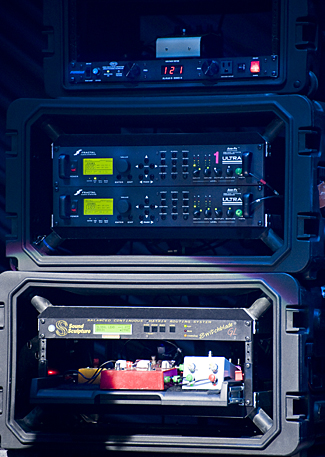 DZ: Yep. And they’re going direct into the P.A. I’ve been pretty amazed that I can get some of the sounds that I’m getting from those boxes. There’s, you know, wild effects that can be used that I, in the Beacon Theater show, I didn’t even get a chance to delve into some of the more insane things that I’ve developed for it.
DZ: Yep. And they’re going direct into the P.A. I’ve been pretty amazed that I can get some of the sounds that I’m getting from those boxes. There’s, you know, wild effects that can be used that I, in the Beacon Theater show, I didn’t even get a chance to delve into some of the more insane things that I’ve developed for it.
But, you know, the way that you can synchronize things and use expression pedals and get to places within effects that I’ve never even thought was possible... I mean, the box is designed to do incredible stuff. For example, it has pitch detection, so you can do something if you wanted where once you got past the twelfth fret, it would turn on delays for you. And once you were playing down on the lower register, it would turn on a flanger for you. It has the capability to recognize things and turn things on and off. So you have this wild ability to (on-the-fly) just completely morph sounds and do stuff that would be about a thousand times more complicated if you’re trying to recreate all of those abilities with just all analog gear.
I had to make the commitment to test it out and embrace in a live situation. And if I hear recordings of it and I compare it to recordings from the big, huge rig, I have sounds that are equally satisfying from both. And Frank would have a different sound on every tour. So what’s crazy about this is that you can build in sounds to emulate things from basically any sound on any record — the complete, finished mastered record sound, which is crazy.
So they really are interesting pieces of gear. I think it’s probably the greatest guitar invention in recent years. I mean, it’s just a crazy magic box. You can do anything with it. There’s always going to be people that say, “Oh, it’s digital, it’s always going to sound digital.” But if you really compare recordings of stuff where you’ve taken the time to really dial it down, then you A/B it, there’s very, very, very few people that would be able to tell the difference on certain kinds of sounds that are just raw amp tones. So I’m impressed by the capability. And it keeps improving. And the guy, Cliff, who designed it, keeps improving it on a monthly basis, with firmware updates and all this kind of stuff.
MPc: It amazes me that it’s basically one guy who built this thing. It just sort of blows your mind that this box came from the engineering talent of one guy, basically.
DZ: Yeah, it’s insane. And I’m one of the people that probably is using it in a more extreme fashion than most other people. I use two of them and sometimes I’m using one machine just to do the left side of the sound and one machine just to do the right side of the sound. And I have to do that because it will run out of CPU power if I try to do both sides with one patch.
If people are excited about guitar, then this is a good way to get into some of Frank’s music. You’ll hear lots of guitar.
MPc: If I were to compare the sound that you had there with what I heard recorded on the Zappa Plays Zappa DVD, the tones you get from the Axe-FX are really proving that modeling can sound as good as the real thing.
DZ: Oh, yeah, for sure. From time to time, I put up clips on the Fractal website of front of house reference mixes, so people can hear the guitar, the guitar tones, direct into the board or direct into the P.A. What ends up being beneficial for the overall sound in running that way, you’re getting rid of at least 90 db stage volume of amps off the stage, which just cleans up everything for the audience. And the guitar’s going only into the P.A. So now you have a complete use of stereo effects and the imaging and the panning and all that stuff is so much more impressive sounding than if you’re miking up a stereo rig.
If you’re playing too loud on stage, you’re barely going to be in the P.A., so once you’re past the mix position, people way in the back, they’re probably not really even going to hear your guitar. You’re going to be really one of the quietest things for the audience to hear. The first thirty rows might hear a lot of stage volume, but as an overall listening experience for everybody, it’s not very balanced when you’re playing too loud on stage.
And it was actually pretty funny, because I was talking to John Petrucci about my whole experience with doing that and why I opted to experiment switching to the Fractal stuff. And I told him, I said, “Yeah, I watched you guys on the first night of the tour and I was sitting back behind the mixer and I couldn’t hear your guitar.” And he said, “What?” You know, because in his ears, he’s got the mix where it’s like raging guitar and stereo and all this. So I said, “Yeah, when you soloed, you actually got quieter.” And so he was all freaked out and concerned. As he should be. (laughs) And I said, “Here’s an option that you should try. Just to reduce your stage volume, you can still play at the same level that you want to run your amps at, but just take your cabinets off stage or put them facing the other way, firing the opposite direction so your front of house guy can put you in the P.A.”
So he did that and it improved the sound drastically for not only the audience, but for everybody on stage. Because, you know, the singer was always having trouble not being able to hear himself enough because the guitars were loud and all this stuff. So he’s been happy that that’s been going better. (Laughs)
He still plays pretty loud, but it sounds much better now that it’s in the P.A.
MPc: Now, talking about your effects. With the switch to the Axe-FX, how much are you using that for the effects versus how much of your rack gear, like Eventide harmonizers and various pedals…?
DZ: There are no things like that in my current rack. The only things other than the Fractal are a couple of distortion pedals that just offer a different texture. But all the effects are in the Fractal.
Any kind of delay or modulation or chorus, flanger, anything like that, it’s all there and I have a wah pedal on my board. Everything else is internal.
MPc: What is your wah pedal of choice?
DZ: I tried a whole bunch of the boutique ones, and I found them to be more hype than anything else, because… I mean, for me and my own playing, the one that sounds the best and is easiest to work is the Dunlop one, the switchless one. It just sounds more retro than any of the ones that are, like, “Yeah, a $400 wah-wah pedal, you know?” I’ve just never been happy with any of the ones that I got. And I’ve bought a lot of those things and ended up selling them.
The thing is, I don’t do a lot of funky wah effects and Frank never did that. Frank used a wah for real tone-shaping stuff, so I’m just sort of riding it and finding little areas where the guitar resonates a certain way. But I’m not really doing “wacka-wacka-wacka-wonda” with the wah ever. So I use it really just for the tone-shaping elements of it. That’s why I like the switchless one, because you don’t have to suddenly go to the sharpest, most trebly sound first. You can start from the lowest resonance. So, for me, that works best.
MPc: I noticed you were using SKB shock mount cases. How do you like those? I’m actually waiting to get some of those in for review. They look pretty nice.
DZ: They’ve been working good. My whole goal was to make this rig as portable as possible. The shock mount is important to keep the Fractals alive, and they’re still… the cases are still bigger than I would like them to be, but that’s what has to be done to make them be able to protect the equipment. So if this stuff’s going to fly somewhere, you don’t want all the electronics in there to get jolted up too much, you know? That’s the whole show. If those things don’t work, I’m screwed.
MPc: And do you mind telling us, what are some of the distortion pedals that you have racked up there?
DZ: I don’t use them all. At the moment I just have some that are in there that I’ve been trying out, but one of the ones that I do use is a sort of a Fuzz Face one that was made by a guy named Alex Saraceno, who is Blues Saraceno’s father. And he makes Dirty Boy pedals — that’s the name of the company. Afro Fuzz is the name of this pedal.
And then some guy in Boston gave me a pedal that he made on this tour that, it’s like a no-name pedal, he just made it in his garage and it actually sounds pretty good, so I put it into the rack at the moment. I got to get in touch with him and tell him that I’ve been using it, because he wanted some feedback on it. It’s basically like a clean boost, but you can also drive it a little bit further into some more distortion. It just gives you your same amp sound, but a little bit louder and with a little bit more of an edge to it. So I think it’s a good-sounding thing. It’s similar to another pedal that I like, the RC Boost from Xotic Effects. But you can distort it more.
And then, let’s see, what else is in there? I have an Octavio, which I think sounds really good. And can’t remember what else. I tried out that Vox Joe Satriani Satchurator thing and I haven’t been able to make that work in a way that would make me keep it in the rack.
And then—oh, yeah, there’s two other things. There’s the Pork Loin and the Fat Sandwich. And I’ll use those for different things. One for a real sustaining sound and the other just for another kind of clean boost.
MPc: Do you have any plans for after this tour either doing some new traditional Dweezil Zappa music — if you can even call it that, or perhaps writing some music with this band in the style of Frank Zappa?
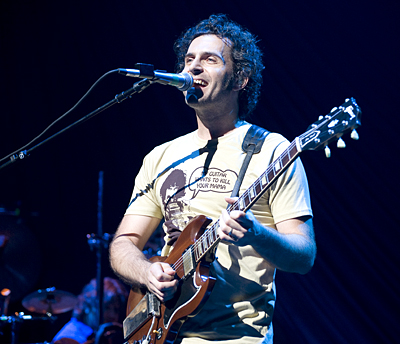 DZ: Well, the thing that’s funny is I’m getting a lot of people asking me about that and I do have plans to write and record some of my own music. But I guess I’m thinking about it in a different way than before. I have different skills now than I did last time I made a record. And also, I haven’t made a record where I had a band for a very long time, so that’ll change how I approach it. And I’m not sure exactly what that’s going to be.
DZ: Well, the thing that’s funny is I’m getting a lot of people asking me about that and I do have plans to write and record some of my own music. But I guess I’m thinking about it in a different way than before. I have different skills now than I did last time I made a record. And also, I haven’t made a record where I had a band for a very long time, so that’ll change how I approach it. And I’m not sure exactly what that’s going to be.
But it’s interesting to me that a lot of people have been asking about it and are interested in the evolution of the band. They like this band as a band, they know it as a band. They know the individuals in the band and they like how we play Frank’s music, but they also want to hear how the band itself will evolve and what it sounds like playing stuff outside of Frank’s music. Which is something I didn’t really take into account in doing this, because it was never the point. It was never like, “Oh, yeah, let me do this and so ultimately I can get to playing my own music.” I had just spent so much time working on Frank’s stuff and just trying to get it right, so we just went out there and did our best with it. And now that there is an audience that knows about us, they’ve adopted the band, so I can see how they would want to hear it evolve into something else, too.
So it’ll be interesting. I just don’t have any clue what it’s going to be yet.
One of the things that we do that’s different than what Frank did in some cases is we’ll actually play particular versions [of songs] that are more familiar, things that really do represent a version from a record. Whereas Frank, every time he went on tour, he would change his material around drastically, just for that particular band on that particular tour. So in some cases, we’re giving people a taste of something that is more familiar because it’s the record version.
So there are subtle, little things that help people get into it more that we provide. But, you know, I think there’s also a bit of a rock edge that’s added in with the way that I tend to play guitar. And it permeates through most of the arrangements of things. So if people are excited about guitar, then this is a good way to get into some of Frank’s music. You’ll hear lots of guitar.

